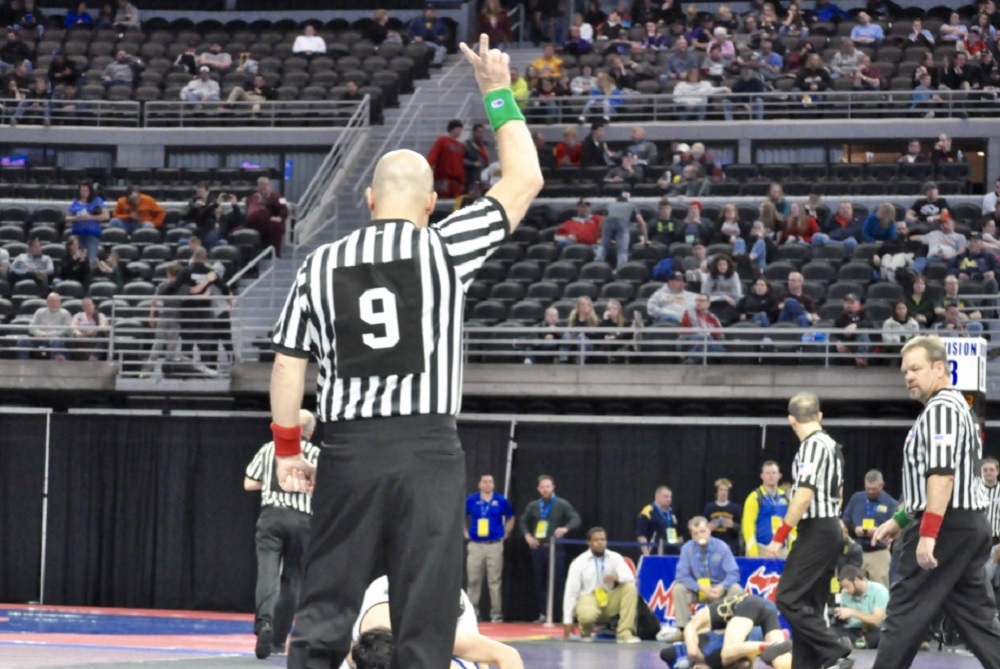
Be the Referee: Communication
December 17, 2015
This week, MHSAA assistant director Mark Uyl explains the expectations for officials working with coaches during basketball games.
Be The Referee is a series of short messages designed to help educate people on the rules of different sports, to help them better understand the art of officiating, and to recruit officials.
Below is this week's segment - Basketball Communication - Listen
The most challenging task in officiating any basketball game for referees is effectively working with coaches. In a perfect world, coaches would simply ask questions on plays they had questions or concerns about and the official would simply respond with a description of what he or she saw on the play.
The very best basketball officials keep the communication with coaches during a game a conversation, not an ongoing argument. Officials need to always be in control of their emotions, answer questions from coaches honestly and head off behavior early that is argumentative and unprofessional. Coaches and officials working together makes for a much better game as everyone in the gym – players, media members and spectators – take their cues for how coaches are acting. When coaches are professional with officials, the entire atmosphere is so much more positive.
Past editions:
Dec. 10: Basketball Excessive Contact - Listen
Nov. 26: Pregame Communication - Listen
Nov. 19: Trick Plays - Listen
Nov. 12: 7-Person Football Mechanics - Listen
Nov. 5: Make the Call: Personal Fouls - Listen
Oct. 29: Officials Demographics - Listen
Oct. 15: Make the Call: Intentional Grounding - Listen
Oct. 8: Playoff Selection - Listen
Oct. 1: Kick Returns - Listen
Sept. 24: Concussions - Listen
Sept. 17: Automatic First Downs - Listen
Sept. 10: Correcting a Down - Listen
Sept 3: Spearing - Listen
Aug. 27: Missed Field Goal - Listen

Be the Referee: Wrestling Start Position
By
Brent Rice
MHSAA Assistant Director
February 24, 2022
Be The Referee is a series of short messages designed to help educate people on the rules of different sports, to help them better understand the art of officiating, and to recruit officials.
Below is this week's segment – Wrestling Start Position - Listen
Today we’re on the mat, ready for the next wrestling match.
We’ve got a wrestler ready to get into the offensive starting position. Which of these should he or she do?
► Place their head on or above the mid-line of the opponent’s back
► Place their arm loosely around the opponent’s body with the palm of the hand placed loosely over the defensive wrestler’s navel
► Not have their legs or feet in contact with the defensive wrestler.
If you said yes to all of these things – you are correct. The wrestler in the offensive position should do all three of those things.
Do that – and you are ready to wrestle.
Previous editions
Feb. 17: Hockey Delayed Offside - Listen
Feb. 10: Basketball Timeout - Listen
Feb. 3: Basketball Video Review - Listen
Jan. 27: Wrestling Inspections - Listen
Dec. 16: Ball Over Backboard - Listen
Dec. 9: Winter Officials Mechanics - Listen
Nov. 26: Instant Replay - Listen
Nov. 11: Tourney Selection - Listen
Nov. 4: Receiver Carried Out of End Zone – Listen
Oct. 28: Volleyball Back-Row Block – Listen
Oct. 21: Soccer Disallowed Goal – Listen
Sept 30: Field Goal Falls Short – Listen
Sept. 23: Volleyball Obstruction – Listen
Sept. 16: Catch or No Catch – Listen
Sept. 9: Intentional Grounding – Listen
Sept. 2: Pass Interference – Listen
Aug. 26: Protocols and Mechanics – Listen

